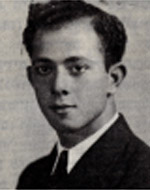Ezer, Yehuda
Son of Ezer and Masuda. He was born on 24 November 1924 in Baghdad, the capital of Iraq. You received his father when he was a young age and his mother devoted himself wholeheartedly to his studies. At the age of seven, he entered the Hovevei Zion school in his hometown, having acquired a great deal of knowledge in the Torah. When he grew up, he began working at the Bank of Otoman, and in the meantime he prepared for the matriculation exams and stood there. Immediately after that, in 1941, he immigrated to Israel on the basis of the authorization he received at the Mikveh Israel agricultural school. A year later he left school and, in order to lend a hand to the country’s building, he enrolled in the Department of Building Engineering of the Hebrew Technion in Haifa. He loved all his friends and acquaintances and as a hardworking student he liked his teachers. Many fought for his existence by working in different jobs, and even his mother, who was abroad, helped him. At the end of two years of study at the Technion, a call was made to join the Jewish Brigade. For this purpose, he received a long vacation from the Technion, participated in battles in Italy and later moved to several countries in the continent (Belgium, France and Germany). After his release from the Brigade he returned to Israel and continued his studies at the Technion. He had just finished his last two years of school when the War of Independence broke out. Then he joined the ranks of the fighters and did various services in the rear and the front. The engineering corps participated in the liberation of the Galilee and the Negev, and eventually moved to the Artillery Corps. Brave and courageous, he was not afraid of any danger. He was then sent to an officers’ course and successfully completed it. The young lieutenant was intelligent in all his ways and close to all his subordinates. In September 1949 he was allowed to attend the “diplomas” at the Technion, and a month later, as a preparatory leave, he met them. After his exams he returned to the army and received a new position as an operations officer. It is not that in addition to his special sensitivity to the suffering of man in his life and to the sight of the troubles of others, he was also troubled by his loneliness in the country without brother and relative, and especially his being away from his family and mother. From the time he arrived in Israel, he worked hard and fought the hardships of loneliness until he completed his studies, but did not receive his certificate by his own hands. On Sunday, 24 March 1949, he died and was put to rest at the military cemetery in Haifa. The Technion’s certificate was attached to his mother’s mother, and his mother’s professional books were devoted to the Hebrew Technion Library.
